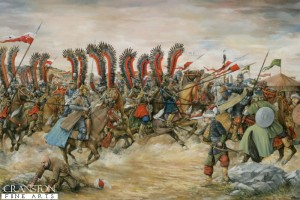More Than Conquerors
If you are interested and have about 36 minutes. Here is my sermon on Romans 8:31-39, delivered at Trinity Presbyterian Church on June 2, 2013. I thank Chris and the Staff for giving me the opportunity to preach tonight!
We have been Duped
My friends, you have all been duped….
Those of you who have ranted about Dan Cathy’s insensitive and bigoted comments, you have been duped…
Those of you who have supported Chick-Fil-A by your reverse-boycott, leading to what may be the best one-day sales ever, you have been duped…
Those of you who have been incensed at the vitriol and the mudslinging, and the political posturing on both sides of the debate, you have been duped…
We all have been duped by a media (both righwing- and leftwing-) that sought to feed the frenzy surrounding a polarizing issue and make it THE issue of the election and our summer. Because making fun of the NBC coverage of the Olympics can only go so far, because watching the efforts of our wanna-be-champions is not enough dirty laundry to feed the talking-heads, because the media believed we, the American public, would take this and ‘run with it’… and we did.
We tweeted and Facebook’ed outrage and fed the fire of vociferous debate with rancor and hatred and accusations of bigotry and racism and whatever ‘isms we could think up… We talked about it, we made signs, we shouted and tweeted some more. Those of us with time photo-shopped pictures for our news feed and those of us without time shared them at the speed of hatred across the digital page.
But not hatred for a people… not hatred for an idea… not even hatred for an opinion…
This was hatred for civility, common sense, and truth.
Did any one of you read Dan Cathy’s comments in their original place? Did any one of you think to see if they were meant to even speak to the issue of Gay Marriage at all??!!!
Here are the offending words:
Some have opposed the company’s support of the traditional family. “Well, guilty as charged,” said Cathy when asked about the company’s position.
“We are very much supportive of the family — the biblical definition of the family unit. We are a family-owned business, a family-led business, and we are married to our first wives. We give God thanks for that.
“We operate as a family business … our restaurants are typically led by families; some are single. We want to do anything we possibly can to strengthen families. We are very much committed to that,” Cathy emphasized.
“We intend to stay the course,” he said. “We know that it might not be popular with everyone, but thank the Lord, we live in a country where we can share our values and operate on biblical principles.”
I doubt most of the talking heads read the original statement, because had they done so, this whole issue would have been over before it began. Dan Cathy’s statement was a statement of support for the family at the end of an article about how his Christianity and ethical beliefs have helped build a company who supports the family. Is it because he uses the words ‘traditional family’ or because he referred to the ‘biblical definition of the family unit’ when speaking to the Baptist Press?
If you really would like to escape the vice of exploitation I dare you to read the entire article at the link below. Print it out and show it to your friends. Post the link to your wall. Go on, I dare you. Because if you do not you, too are a part of the problem.
http://www.bpnews.net/BPnews.asp?ID=38271
It is time for you and I to stop pandering to the wishes of the media to have a frenzied debate about an important topic based upon a man’s comments taken out of context and upon whom they have bestowed the title of lightning rod. If we are going to debate, let’s begin that debate with a stand on the facts and some sort of civility. Otherwise we might as well crawl back into whatever cave from which we let the news media crawl out.
(dismount from soap box)
The Rules
On NCIS, through flashbacks we meet Gibb’s wife. At one point she tells him that a man should have a set of rules to live by, and he begins to write down the rules that in the show are ubiquitous. Rule # 1 – never screw a partner. Rule # 8 – Never Assume, and so on. Perhaps that was where I got my idea to number these rules. Some of which I have had long before NCIS came on the air, and many of which have changed over time. Some rules have fallen off my list. Even in my days of full debauchery during my flight from all things holy, I still had the rule “Never ever on a first date…” and it served me well, keeping me out of a heap of troubles. I do not need that particular rule after 13 years of happy marriage, but others stay with you.
Over the years the list has solidified into principles that guide my career, my job, my behavior and how to think about life. At work, some rules are quoted not just by me, but by those who have worked with me long enough to have them memorized (Trust but verify, Never Assume, Hope is not a Strategy, etc.). Since a coworker has asked me to publish them, here they are. I reserve the right to change them at any given time and perhaps will choose to come back and explain them in a little more detail, but this snapshot shows what the first 31 rules look like as of 5/2/2012. Perhaps they will help you, or entertain. Aside from Rule #1 and maybe #2, there is not really any order or rhyme (see rule #14). These are my rules, I suggest you develop your own, because otherwise, you would be violating rule #15.
- God is God, and I am not, I promise not to usurp his spot.
- Love with all your heart and all your soul and all your mind. Anything less is not love.
- There are no completely satisfactory answers to the ‘why’ questions this side of heaven.
- Fight for the important things and be willing to give up everything else.
- Never use words when actions alone will do.
- If you accept status quo, then you condone it, and it will blind and bind you.
- Always be totally honest, the smallest lie destroys a mountain of trust.
- Problems should be addressed by those who find them, lest they become part of the problem.
- A plan made and changed is more effective than a change-made plan
- Ignore rules without consequences, they are obviously meant to be broken.
- “Do not hike this trail in bad weather” signs are posted for your benefit, ignore them only if you wish to prove your stupidity beyond a doubt.
- Hope is not a strategy, so plan for the worst but expect the best
- Derision is not a motivational tactic, but it is a character indicator.
- When there are multiple #1 priorities, there is no #1 priority.
- Trust but verify, unless the trustee is benevolent, omniscient, and omnipotent.
- Lead with expectations, people will rise or fall to meet them.
- Do not waste time determining the ‘right’ way to do the ‘wrong’ thing.
- Avoid false dichotomies, ‘either… or’ is often, more correctly ,’both… and’
- Sometimes the only thing you can do is to hack it.
- Pursue laughter, because weeping pursues you
- Two wrongs do not make a right, but they can make a better wrong.
- If you do not have time to do it right, you must have time to do it again.
- Get it done, let someone else worry about who gets credit
- Don’t ask for an opinion you have no intention of considering
- If you want an answer, be specific with your question.
- In theory, there is no difference between theory and practice, but in practice there is.
- The knife you use to cut corners will turn on you one day.
- Refusal to reconsider past decisions ensures failure in future endeavors
- Never assume, and test all assertions.
- The glass is neither half-full or half-empty. It is simply not full. Drink it down and get another.
- What did thought do? Nothing by itself, action is required to realize and validate the thought, so have a predilection to act.
- Measure twice, cut once
- Get your own stuff together first, then you can help others. (Put on your own mask, so that you can help others…)
- If you are given experienced directions to succeed, follow them to success, or don’t and accept and embrace failure.
- Everyone has wisdom to impart, but not all their wisdom should be given the same weight
- Apologies cost you only pride, but they buy a ton of goodwill.
- Adults learn best from demonstration and enablement, so more do, more partnering, less talk.
- People yearn for validation more than for guidance, so always begin with affirmation.
- You do not have because you do not ask, so ASK Audaciously!
- There’s lots of wiggle room between the contour lines.
- Truth cannot be subjective when your life is at risk, though your judgment of it may be.
- The goal is not just to find out the answer, but to learn to ask a better question.
- Good architecture cannot be achieved by executive edict, but only by principled co-creative collaboration.
- Be skeptical of advice from anyone who does not get paid to give that advice.
- Getting started is hard, but it’s the first step in acceleration. Focus on getting started first.
- People rarely exhibit behaviors that get them what they want, so evaluate/address behaviors separately from intent.
- Incremental change is he only lasting change.
- The only thing I can change directly is myself.
- Make sure it’s your fight before you start swinging.
- Mastery is achieved one step at a time; limit your WIP and use the Power of FOCUS.
- Time is better spent on leveraging what people CAN do than on criticizing what they CANNOT do.
- Great minds discuss ideas; average minds discuss events; small minds discuss people. (Henry Thomas Buckle) Strive for greatness at all times!
- Never confuse being BUSY with being PRODUCTIVE.
- No Challenge, No Change.
- Stop being surprised at unsurprising things.
- It is never a failure if you gain wisdom or knowledge from it.
- You cannot measure wisdom, but you can measure its application.
[Last Edited 8/31/2023)
By the way, here is the video from NCIS. (Now unavailable)
History – An Introduction
I love, love, love history. However, until my freshman year at Middlebury College, I hated all history classes. (This is the kid who bought a set of encyclopedias just to read through the ‘W’ section on the World Wars.) At my high school the history teachers were the Physical Education Teachers or the Coaches who needed to do something else besides inflict shame and punishment upon unsuspecting gym students in adolescent angst. And it was not good. We actually celebrated when the history/phys-ed teacher was promoted to be Vice Principal.

Anyway, finally for my Freshman year at Middlebury, I was able to get into this class with this amazing History Teacher, who was teaching his last class after something like 120 years of teaching at Middlebury. The class was basically a close look at a number of individuals who personally affected the tide of history. These were people that made a difference. And the professor, who was legendary at Middlebury by this time, made them, not only interesting, but fascinating. This was the way history was supposed to be taught! Vibrant, passionate, effective and interesting! The fact that he was a balding, ancient man with wisps of hair all strewn about and virtually danced across the stage for an hour (we had a pool going on whether he would have a heart attack during a lecture before he retired–he would not have minded going out like that, I think) without notes helped his mystique.
Since that time, I have looked for those events, people, places, things of history that are either what Thomas Cahill calls “Hinges” (something upon which history turns, an event that changes everything), what Dr. Who would call “fixed points” (things that must happen, and cannot change otherwise the fabric of time would come apart). What Dr. Honeycutt, my current Church History professor at Covenant Seminary, would call, ‘timeline’ events.

So this series of blog posts are my attempt to imitate what that ancient, whispy, energetic history professor did with history at Middlebury, and to satisfy a class assignment for the Timeline.
Based on your reading of Gonzalez, provide a timeline of Church history for the last 500 years (approximate), listing what you believe to be the 50 key dates of people and events. You may be as creative as you like, providing me a hard copy of the timeline, or you may use something like timerime.com, tiki-toki.com, or xtimeline.com to generate an online version.
* Justo Gonzales, The Story of Christianity: Volume 2: The Reformation to the Present Day ( )

I hope you enjoy it, and I hope it begins to approach the passion of those involved in some of these events.
Beginning of the Protestant Reformation
(1) Erasmus publishes the Handbook of the Christian Soldier (1503) – Desideratus Erasmus published a book called The Handbook of the Christian Soldier and quickly became known as the prince of the humanists. A ‘humanist’ at this time was a scholar who sought to restore the literary glories of antiquity and the study of all “humanities” subjects. (This idea was eventually abased to the large number of 20th century humanities majors who sought to abuse them.) Erasmus and his fellow humanists sought reformation of customs, the practice of decency and moderation, and a combination of learning and meditation that shaped and changed human behaviors. In short, they valued doctrine, but they valued obedience even more. Erasmus’ writings encouraged many of the reformers, and though he would part ways doctrinally with them, his works could be considered some of the tinder upon which the sparks of Luther’s passion caught flame.

(2) Luther Nailing the 95 Thesis on the door at Wittenberg (1517) – October 31, 1517, Martin Luther, a professor at the University of Wittenberg, posted a paper in Latin on the cathedral door designed to spark debate among the clergy at the University. His last attempt at teaching some radical ideas had received little more than yawns, he perhaps held out little hope for this paper. He probably expected it to get no farther than the local theological journal. But someone translated it into German and it caused an uproar because it spoke against the very method that the lord and prelates and the church itself used to reap monetary profit – the sale of indulgences. These 95 theses set off the spark that became the protestant reformation.

(3) Luther before the Imperial Diet at Worms (1521) – In 1521, Luther was called before the Diet of Worms (what a name, right!?) to answer for his treasonous statements. He was called to recant his writings or to be excommunicated from the church. Luther had never sought separation from the church, but had encouraged reformation of the church from within. But the Holy Roman Emperor and the Pope had decided that this rebellion needed to be squelched. Luther asked for a night to consider (smart move), but on the next day he uttered words that encourage all who hold to the authority of scripture. “My conscience is held captive by the word of God. I cannot and will not recant for to obey one’s conscience is neither just nor safe. God help me. Amen.” Luther did not blink and the reformation was unstoppable.
(4) Luther at Wartburg translates the new Testament into German (1521 – 1523) – Originally Luther had been ‘kidnapped’ after his capture had been called for by the emperor. It turns out the kidnappers were friends or supporters of Luther who took him to Wartburg. While in ‘hiding’ there he translated the New Testament into the ‘vulgar’ or common German language. Aside from just providing a translation of the New Testament for Germans to read and study for themselves, this translation (and his later Old Testament translation) served to standardize the German language itself and lead to a phase of literary German that had not occurred prior.

(5) Founding of the Anabaptists and the Baptism of Blaurock & Grebel (1525) – Every movement of change has its radical members. One such group was founded by the mutual re-baptism of the founders of the Anabaptists, Blaurock and Grebel. The Anabaptists (or re-baptizers) were a group of Christians who felt that only believers should be baptized and that all infant baptism, or baptisms performed only as a ritual to become a member of a church were not valid. They believed only in the baptism of professing believers. They also believed there should be a contrast or a separation between the structure of the church and the structure of government. Both of these beliefs were seen as a threat to the established order since the church and its rituals were part of the social and political fabric of the times. For this reason they were persecuted by both protestants and Catholics.

(6) Confession of Schleitheim (1527) (bonus if you can pronounce it) – In response to the Catholic states of Switzerland and the Council of the Government of Zurich (protestant) condemning them to death, the Anabaptists wrote down the seven fundamental beliefs which they believed. Carrying on the confessional nature of Christianity, they judged it only fair that if they would be condemned in both civil and ecclesiastical courts, then the world ought to know why they were being condemned.

(7) Turks defeated at Vienna (1529) – In the midst of the turmoil created by the reformation, the fragile alliance of various powers of Christendom was critical. The reformation was allowed to grow in part because of the threat of an external power, the Muslim Turks. The Holy Roman Emperor could not afford to alienate his alliance of princes by any strong force of power against the protestants when the Turks were seeking to take territory from him. The breaking of the siege at Vienna required an alliance of many major powers, both protestant and Catholic. The Turks were defeated at Vienna, but their continued threat forced the Emperor to allow the princes to continue to practice their Protestantism in order for him to have their continued support.

(8) Augsburg Confession (1530) – Charles V returned to Germany to attend the Diet of Augsburg. He has not listened to Luther in 1521, but this time he ordered an exposition of the points at issue. The result of this request, written by Philipp Melanchthon, is now known as the Augsburg Confession. This confession presented a summary of the protestant beliefs and was signed by most of the Princes and Lords of Germany to present a united front to the Emperor. Despite the Emperor’s call to recant, the Princes held firm in their resolution. For some time after this the Lutherans referred to themselves as “Christians of the Augsburg Confession.” The Emperor eventually signed the Peace of Nuremburg in 1532 with the Princes allowing them to practice their faith.

(9) The Act of Supremacy (1534) – England’s King Henry VIII had originally been a great supporter of the Catholic church against the ‘scourge’ of Luther’s heresy, but eventually he came into conflict with the Pope. While Henry did not agree with Protestantism, he did not appreciate what he believed was the Papacy’s interference with the authority of the Crown. In 1534, at his behest, Parliament declared Henry the “supreme head of the church of England” and annulled his marriage to Catherine.

(10) Calvin goes into Exile in Switzerland (1535) – In 1533 at the College Royal in Paris, a close friend of Calvin, Nicholas Cop, devoted his inaugural address to address the need for reform and renewal in the catholic church. Cop who was branded a heretic and Calvin was implicated in his offense and forced into hiding for a year. After Francis I of France decided he would no longer tolerate Protestantism, Calvin fled to Switzerland where he joined Cop in Basel. Later the majority of Calvin’s ministry would be spent in Geneva.

(11) First Edition of Institutes of the Christian Religion published (1536) – Only one year after arriving in Switzerland, the first edition of the Institutes of the Christian Religion was published. It would undergo several more published editions before Calvin died (no one is quite sure whether Calvin was actually finished, but God must have felt he was). This work went form 6 chapters in the first edition to 4 books in the final edition of 1559. It was the first work of systematic theology from the Protestant reformation and as such would influence all systematic doctrines to follow. It was developed to formulate the proper doctrine from the Bible and from previous theologians, back to Augustine in a form that could be widely read and understood in order to combat the heresies and errors of the age.

Notice the importance of the written word to the historical faith. In both confessions of belief, systematic theology and, above all, in translations of the Bible, the Christian faith is a faith of words.
